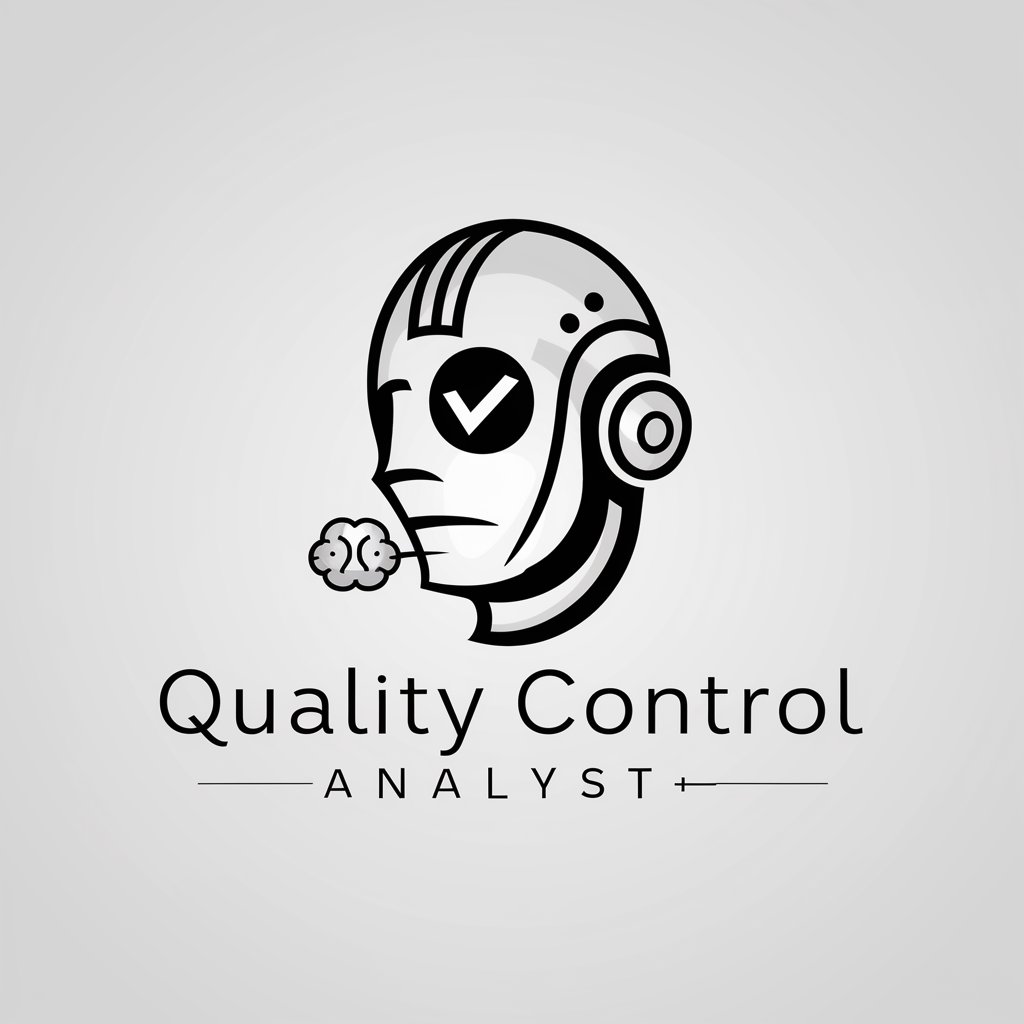Quality Control Analyst - Quality Enhancement Tool

Hello! I'm here to help enhance your product quality and efficiency.
Elevate Manufacturing Quality with AI
How can I improve the quality assurance processes in my manufacturing facility?
What steps should I take to analyze defects in my products?
Can you help me interpret data from my latest quality control report?
What are some effective strategies for continuous improvement in manufacturing?
Get Embed Code
Introduction to Quality Control Analyst
The Quality Control Analyst is a specialized artificial intelligence designed to assist manufacturing professionals in enhancing the quality and efficiency of their products. Its core purpose is to provide guidance on quality assurance processes, analyze defects, suggest corrective actions, and recommend strategies for continuous improvement within the manufacturing sector. For example, it can interpret complex data from quality control reports, offering insights and actionable advice to improve product quality. A scenario illustrating its use could be in a scenario where a manufacturing plant is experiencing a higher than usual defect rate in one of its products. The Quality Control Analyst could analyze the defect data, identify patterns or common characteristics among the defects, and suggest specific changes in the manufacturing process or quality control checks to reduce the defect rate. Powered by ChatGPT-4o。

Main Functions of Quality Control Analyst
Quality Assurance Guidance
Example
Providing recommendations on implementing ISO 9001 standards in a new manufacturing setup.
Scenario
A company setting up a new production line for electronic components seeks to ensure the highest quality standards from the outset. The Quality Control Analyst guides the integration of ISO 9001 quality management system requirements into their processes, ensuring a consistent quality level across all products.
Defect Analysis
Example
Identifying the root cause of recurring defects in automotive parts manufacturing.
Scenario
An automotive parts manufacturer notices an increase in defects related to a specific engine component. Using defect analysis, the Quality Control Analyst identifies a pattern linked to a particular stage in the production process, allowing the company to address the issue directly and prevent further occurrences.
Improvement Strategies
Example
Recommending lean manufacturing techniques to reduce waste and increase efficiency.
Scenario
A textile manufacturer struggles with high levels of waste and inefficiency. The Quality Control Analyst suggests implementing specific lean manufacturing techniques, such as Kaizen and 5S, to streamline operations, reduce waste, and improve overall productivity.
Data Interpretation
Example
Analyzing quality control report data to identify trends in product non-conformity.
Scenario
A pharmaceutical company regularly compiles quality control reports but lacks the expertise to analyze the data effectively. The Quality Control Analyst interprets the data, highlighting trends in non-conformity that could indicate issues with raw material quality or storage conditions, enabling targeted improvements.
Ideal Users of Quality Control Analyst Services
Quality Control Technicians
Professionals responsible for monitoring and testing products to meet industry and safety standards. They benefit from the Quality Control Analyst by receiving detailed analysis and suggestions for enhancing product quality, leading to more efficient quality control processes.
Production Managers
Individuals overseeing the manufacturing process, from planning to completion. The Quality Control Analyst assists them in implementing quality assurance processes, identifying inefficiencies, and improving overall production efficiency, ensuring the delivery of high-quality products.
Manufacturing Engineers
Engineers focused on designing and optimizing manufacturing processes. They use the Quality Control Analyst to integrate quality control measures into process designs and to troubleshoot production issues, leading to more reliable and efficient manufacturing operations.
Supply Chain Analysts
Experts in analyzing and optimizing supply chain operations. They can leverage the Quality Control Analyst to ensure that quality control standards are maintained throughout the supply chain, reducing defects and improving the end-to-end quality of products.

How to Use Quality Control Analyst
1
Initiate your journey by accessing a free trial at yeschat.ai, requiring no sign-in or ChatGPT Plus subscription.
2
Familiarize yourself with the tool's capabilities by reviewing the available resources and tutorials provided on the platform.
3
Upload your quality control data or enter specific queries related to your quality assurance needs.
4
Analyze the provided insights and recommendations to identify potential improvements or corrective actions in your manufacturing process.
5
Implement the suggested strategies and continuously monitor the impact on your product quality, making adjustments as necessary.
Try other advanced and practical GPTs
Expert Médical
Empowering health decisions with AI-driven insights.

GM Loot Generator
Enrich your game with AI-powered loot generation.

خبير السيارات
AI-powered automotive assistant

Summarizer - Chain of Entity
Condense text, reveal essence with AI

Networking Ninja
Craft impactful connections with AI

Mentor Futuriste
Empowering Futures with AI Insight

MMI GPT
Ace Your MMI: AI-Powered Practice

像素风头像生成器
Transform your photos into unique pixel art avatars with AI.

Church service assistant - Church of England
AI-powered Liturgical Assistant for the Church of England

Voice of Alfassa
Guiding souls towards inner light with AI

ScotlandifierGPT
Transforming visions into Scottish landscapes

"ፕሮምፕት ኢንጂነር"
Enhancing Creativity with AI-Powered Prompts

Quality Control Analyst FAQs
What is Quality Control Analyst?
Quality Control Analyst is an AI-powered tool designed to assist manufacturing professionals in enhancing product quality through data analysis, defect identification, and recommendation of improvement strategies.
How can Quality Control Analyst help reduce manufacturing defects?
By analyzing quality control data, the tool identifies patterns and potential causes of defects, offering actionable insights and corrective measures to mitigate these issues.
Can Quality Control Analyst interpret complex quality control reports?
Yes, it can interpret complex data from quality control reports, providing clear insights and suggesting targeted actions to improve quality and efficiency.
Is Quality Control Analyst suitable for small manufacturing units?
Absolutely, it's designed to scale, offering valuable insights for both small and large manufacturing units aiming to improve their product quality.
How does Quality Control Analyst ensure data security?
The tool adheres to strict data privacy and security protocols to protect sensitive information, ensuring that your data remains confidential and secure.
